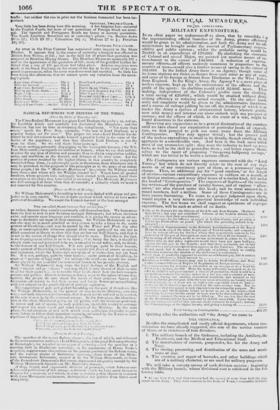The Ultra-Radical Movement has given Lord Durham the go•by ;
or, rather, Iris Lordship wisely and manfully has disclaimed the Mountain ; and the Aloutirain has lost no time in returning the compliment. " Not many (lays Since," quoth the True Sun, solemnly, " the sun of Lord Durham, as a popular leader, set ,thr eeer." The grapes are sour—Lord Durham has de- clared he will not consent to make himself a popular leader in the sense of the hacks of the populace; and then they discover Lord Durham is not the "ban for them. So we told them three years ago. * • • We mean nothing personally disparaging to the honourable baronet, (Sir Wil- liam Molesworth,) as regards his abilities or honesty, when we say that nothing is easier for any man of station and property than to obtain a reputation sudden, noisy, and worthless, as the deserter and del.:ruler of his own class. Let the portion of power retained by the higher classes in this country be completely wrenched from them, (a catastrophe quite as disastrous, from whichever side it xray be provoked, to the progress of free principles as to the peace of an indus- trious people,) let the " .31xlerate Ilsibrintra" he—where Sir William would lave them—and where will Sir William himself be ? Where have all genteel levellers, whose projects have unhappily been cursed with success, found their own place in the chaos they have toiled in creating ? The Moderate Reformers are well revenged of them when they do succeed ; a calamity which we trust is Lot reserved for this country.
:Fro.% ole OlJe of :IP nday.:
Sir William Moleaworth's friendship is too much dashed with pique and pre- judice to be very candid. We coeld spare candour which strives to hurt ander pretext of friendship. We count the Cornish baronet at the best amongst
"Those
Who are called friends because they are not Act ;" or rather, because they cannot consistently call themselves foes. We have never Leen the first to seek to sow divisions amongst Reformer,; but where divisions exist, and operate upon language and conduct, it is giving the enemy an advan• tage to dissemble our sense of their existence. Sir William 31olesworth or any one else may do as much mischief as they choose to take a fancy to do, under pretext of friendship—and may be quoted by the Times and Post, (lay after day, as unexceptionable witnesses against their own party—if we are not to think ourselves at liberty to show that they are but our ha/J.-friends, and that it is not in the nature of things they should ever he more. That this is the fact, is no disparagement either to us or to them ; that, being the fact, it should be clearly made out and perceived to be so, is essential to our safety, and, we think, to the honour of our hrt/l-friends. It is not, perhaps, quite to their honour, under pretext of friendship, to indulge in regrets and .6ors of events as certain and initninent, which the Tories dare not speak of aS such—dare not yet hope for. It is not, perhaps, quite to their honour, under pretext of friendship, to sneer at " persons of high rank" for telling—the truth—as regards the confi- dence placed by our youthful but instructed I Neen in her present advisers. Sir William 31oleswortir nosy term the loyal feelings of the English awl Irish " fancies and ; " and any think it very absurd of theta to care at all for their queen 1,..e, or to trouble their heads about how she feels towards persons and patties. Absurd, however, as it may set an to the spleen ,f some dog- =Mists, the people do care about the views of their gracious Queen and Governor—do rejoice to feel their yeong end lovely Sovereign sympathizing svith her subjects in the grand objects of national aspiration. 'fl. supposition of pure and perfect friendship on the part of frondeurs like Sir William Molesworth, to the ',resent or any mo lerate :Nlinistry, cuts two sew..., and both ways so mischievously, that it must too be suffered to be worked, at the rate it now is, by the common enemy. In the first place, the identifica- tion of the whole :Ministerial party, on all points, with the doctrines professed, in season and out of season, by such 1w:inch:to, inevit (lily tended to estrange and disghst the more tliaid awl sober friends of the :Ministry. In the next place, Ow vaticinations of evil with which such politicians invariably requite every failure to follow their impatient counsels, are seized by the 'furies as anti- cipations of impending min from friendly eiaafters.
tic avowed, the th.. 7:: rool.o..fie;: If It I c'n. nte,d, perhap, iii o!, turn. BA of ,■11 'leaven, thy it tilt can send— Save, ,aVe, oil Me fr.,m the cwrii4 !"
e
The speeches nit the recent Reform linnn., ti.e last of which, and delivered to the niost numerous audience (Lord Ebrirqton's, at the great Returns yothering at Barnstaple), we reported in our paper of y:,-tezdry—and the speedier( at a 'fleeting held in Illackfriars yesterday, on the anniversary of Horne Tooke's acquittal, suggest some observations on the present position of the Reform cause, and the various shades of Reforming opinious,—from those of the 31(ele- rate Aristocratic Reformers, sneered at by sir William 3Iolesworth, to those of the Immoderate Democratic Reformers, represented adequately enough by Sir 3% rlhiurrn 31olesworth himself—in Mr. Roebuck's absence.
A deep, broad, and itheassable division principle, exists between our. farts and politicians of this stamp..--a division a, hich we have never chosen to di...guio.r: for a monient, and which, leaving us certain public objects in common With tlit4C Movenientarcalerators, distinguishes our politics trona theirs most Completely.


























 Previous page
Previous page